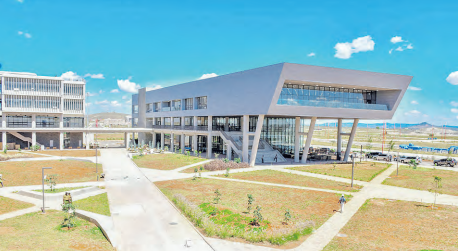
During the official launch of phase 1 infrastructure and smart city facilities at Konza Technopolis, President William Ruto set an audacious target: “We will move this country from a third world to a first-world country by 2055.
We have the ideas, the plan, the people and the resources to take us there.” The President went further to elaborate that early 60s were at par with Asian tigers like Singapore and South Korea. And my conviction is, yes, it is possible, and this is how.
This declaration demands more than optimism. It calls for deliberate investment in vital sectors including science, innovation, education, leadership and a shift in national mindset and work ethics. Let me elaborate.
When Singapore gained independence in 1965 and South Korea emerged from war in the early 1960s, both were poor, agricultural and aid-dependent.
Through visionary leadership, strict governance and strategic industrialisation, they transformed within a generation. Singapore became a global hub for finance, logistics and technology. Korea grew into an industrial powerhouse of shipbuilding, electronics and automotive engineering.
Several Kenyans, including us in the public sector, have visited these countries and witnessed the transformation within a span of about 30 years.
Their secret lay not in natural resources but in discipline, education and innovation. Kenya can follow that path, if we combine the clarity of purpose of those nations with our own creativity, including our youth and resilience and clear unity of purpose towards that direction.
Science, technology and innovation must anchor Kenya’s long-term transformation. No country has reached first-world status without investing heavily in research and development.
Above all we are not fully depend on external funding. Currently, we are investing around 0.8 per cent of the GDP and aiming at one per cent progressively towards two per cent in this sector. Countries such as Singapore and Korea are spending one per cent and 4.9 per cent for R&D of GDP.
In so doing we shall establish innovation parks and build research clusters and link universities with industry to turn ideas into enterprises and demonstrate impact in the society through wealth generation and job creation.
We cannot do everything at once hence we will need to prioritise sectors in phased approach. These include agriculture, manufacturing, renewable energy, digital technology, health, the blue economy and climate adaptation. Innovation in all these sectors can generate jobs; raise productivity and position Kenya as the region’s technology and research hub.
As the President said, it is unacceptable that we spend almost Sh500 billion importing food, hence will need strategies to be self-sufficient and even exporter; we shall need to expand our electricity generation from around 2300 MW to 10,000MW to propel our industries and expand on the infrastructure to cater for projected Kenya population of around 84 million by 2050.
One other major ingredient in this vision is human resources. A nation’s real wealth lies in its people. To compete globally, we will need relevant human capital — scientists, engineers, technicians, entrepreneurs and innovators, economists etc.
We shall be able to do this by continuing with relevant education reforms which in my opinion must prioritise Stem, Tvet and lifelong learning, producing problem-solvers rather than certificate holders. Universities and colleges must partner with industries for practical training, while counties invest in technical institutes that equip youth with 21st-century skills with entrepreneurial flavour. More job creators rather than job seekers.
Our systems must start aligning to that vision towards first world status by 2055 in a sustainable manner, and not only short-term gains.
The good news is we are on that trajectory with Bottom-Up Economic Transformation Agenda plan, Vision 2030 and revival of National Economic Social Council. While we are on this path, we must have sound governance, accountable leadership and maybe new work ethics.
The countries we are benchmarking with – Singapore and Korea built efficient, merit-based public services that rewarded integrity and punished mediocrity. Kenya’s civil service must embrace a new ethic of performance, transparency and accountability.
Public officers should be facilitators of innovation, respond to the needs of the society and not gatekeepers of bureaucracy. Above all, we must think outside the box or create new box.
We must embrace inclusivity and move forward together; hence citizens must
adopt a productive mindset – valuing time, honesty, teamwork and excellence. As
President Ruto has emphasised, “We must believe in ourselves and work with
focus and faith to transform our nation.”
I’m being reminded that without discipline and cultural change, even the best plans will falter. Governments set direction, but the private sector drives growth – therefore we must enhance that enabling environment for private sector to flourish, as they are growth engine.
The framework of PPP is there and we must take full advantage of it for development projects. Kenya’s entrepreneurs are already pioneering in agriculture, ICT, renewable energy and creative industries.
We have more that 200 innovation hubs, to reach first-world status; the state must enable them – through predictable policies, access to finance, and a stable regulatory environment.
The State Department of Science, Research and Innovation is currently looking at AI policy, Startup bill, STI Policy, Research and Development Policy among others that will contribute in other similar undertakings in other state departments. Foster collaboration and breaking the silos within the state departments.
There is a need to bring all research institutions under one umbrella state department. Start-ups should be nurtured into scale-ups towards commercialisation, counties should become innovation hubs; and partnerships with global investors should be anchored in technology transfer and local content.
This integrated approach links leadership, innovation, and citizen responsibility- the ingredients of sustainable prosperity. My message to fellow citizenry is that transforming Kenya into a first-world country is not about 2055 alone; it begins with the attitudes we adopt today. I’m optimistic will make it.
Singapore and Korea proved that transformation is possible within one generation. So can Kenya - if vision is matched by hard work, innovation, strong science diplomacy, people centred programmes and ethical leadership. Thank you, Mr President, for showing the way.
The writer is the PS for Science, Research and Innovation, [email protected]
















